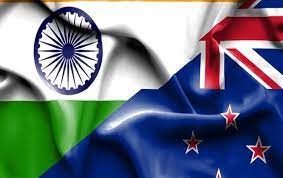Description

Disclaimer: Copyright infringement not intended.
Context
- The Union Cabinet chaired by the Prime Minister, Shri Narendra Modi has approved the proposal to open of a Consulate General of India in Auckland, New Zealand.
India New Zealand Relations
- Diplomatic Relations: India and New Zealand maintain cordial diplomatic ties since 1947, collaborating in international forums like the UN and WTO. Both countries share common values as Commonwealth members.
- Trade and Economy: Trade relations have been growing steadily, covering sectors like agriculture, information technology, and education. The India-New Zealand Free Trade Agreement (INZFTA) signed in 2020 aims to boost economic ties. Bilateral trade stood at $1.5 billion in 2021.
- Agricultural Collaboration: India and New Zealand collaborate in agriculture, with a focus on technology exchange and improving farming practices. The Agriculture Cooperation Arrangement and the Joint Working Group on Agriculture contribute to this partnership.
- Education and Cultural Ties: Education and cultural exchanges are robust, with Indian students pursuing higher education in New Zealand. Both nations actively promote cultural events, fostering a better understanding between their people. The Education Cooperation Agreement enhances academic collaboration.
- Tourism: Tourism plays a significant role, driven by the diverse landscapes and cultural heritage of both countries. Joint tourism promotion efforts contribute to people-to-people connections. In 2019, over 60,000 Indian tourists visited New Zealand.
- Defense and Security: While defense ties are not as prominent, both countries engage in dialogues and initiatives to enhance security cooperation. Areas of focus include counter-terrorism and maritime security. The Defense Cooperation Arrangement facilitates strategic dialogue.
- Multilateral Engagement: Active participants in global forums, India and New Zealand collaborate on shared challenges such as climate change and sustainable development. Both nations advocate for the reform of international organizations. They work together in the International Solar Alliance to promote renewable energy.

Way Ahead
Looking ahead, there are several avenues for India and New Zealand to strengthen their relationship in positive ways:
Enhanced Economic Cooperation:
- Both nations can work towards maximizing the benefits of the India-New Zealand Free Trade Agreement (INZFTA) by exploring opportunities for increased trade and investments in diverse sectors.
Innovation and Technology Collaboration:
- Foster collaboration in innovation and technology, especially in areas such as renewable energy, biotechnology, and information technology. Joint research and development initiatives can contribute to mutual growth.
Cultural Exchanges:
- Expand cultural exchange programs to deepen people-to-people connections. Encourage more artistic, educational, and sports exchanges to promote a greater understanding of each other's cultures.
Tourism Promotion:
- Continue joint efforts to promote tourism by showcasing the rich cultural and natural heritage of both countries. Develop sustainable tourism practices and initiatives to attract a diverse range of visitors.
Educational Partnerships:
- Strengthen academic collaborations and student exchange programs. Encourage partnerships between educational institutions to promote knowledge sharing and research initiatives.
Environmental Sustainability:
- Collaborate on environmental conservation and sustainable development projects. Share best practices in addressing climate change, preserving biodiversity, and promoting green technologies.
Security Cooperation:
- Deepen security cooperation by expanding dialogues on counter-terrorism, cybersecurity, and maritime security. Joint military exercises and training programs can enhance the capabilities of both nations.
Multilateral Advocacy:
- Continue joint efforts in international forums to address global challenges such as climate change, sustainable development, and public health. Advocate for reforms in international organizations to better represent the interests of developing nations.

People-Centric Initiatives:
- Implement initiatives that directly benefit the people, such as skill development programs, health partnerships, and disaster management collaborations. This can contribute to the overall well-being of the populations in both countries.
Regular Bilateral Dialogues:
- Establish regular high-level dialogues to address emerging issues and assess the progress of ongoing collaborations. This can ensure effective communication and coordination between the two nations.
- By focusing on these positive avenues, India and New Zealand can build a stronger and more resilient partnership that benefits both countries and contributes to regional and global stability.
|
PRACTICE QUESTION
Q. Examine the multidimensional aspects of India-New Zealand relations, considering diplomatic, economic, and strategic dimensions. Discuss the challenges and opportunities in the current state of India-New Zealand relations, and suggest potential areas for enhanced cooperation.
|









